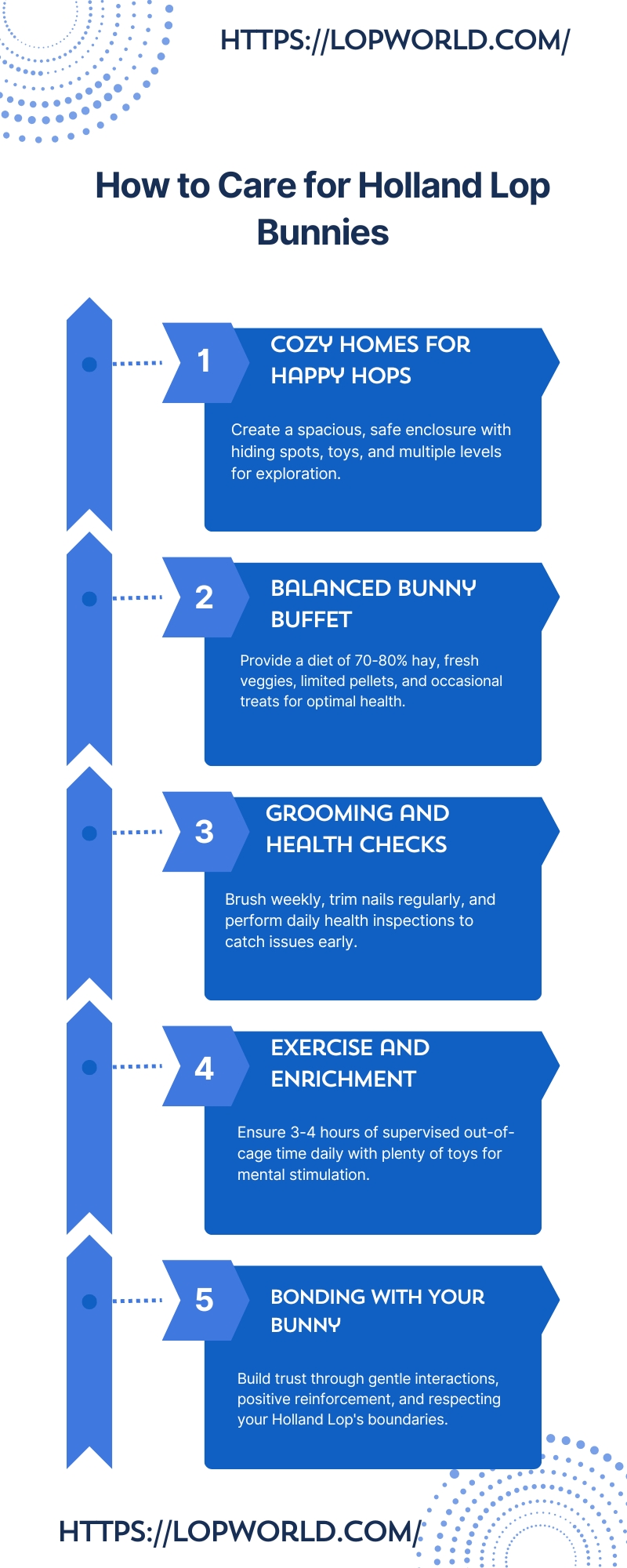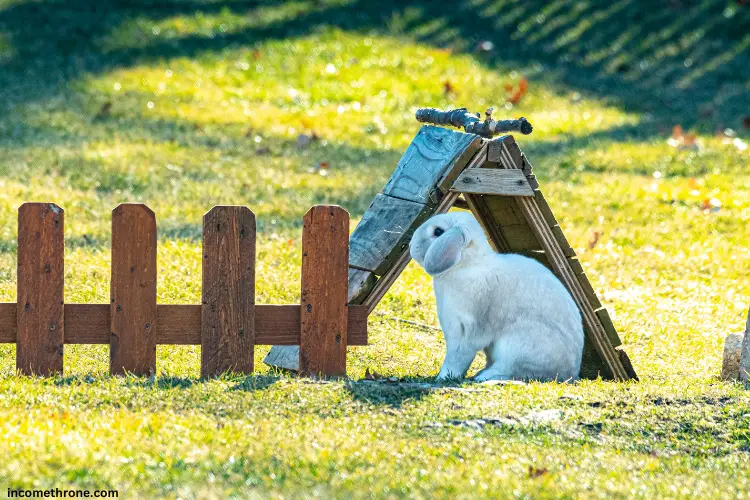Holland Lop bunnies are adorable, compact rabbits known for their floppy ears and friendly personalities. As a popular pet choice, these charming creatures require specific care to ensure they lead happy, healthy lives.
In this blog post guide, we will provide you with all the essential information you need to properly care for your Holland Lop bunny, from housing and diet to health concerns and social needs.
Understanding Holland Lop Bunnies
Before diving into care specifics, let’s explore what makes Holland Lop bunnies unique:
- Origin: Developed in the Netherlands in the 1940s
- Size: One of the smallest lop-eared rabbit breeds, typically weighing 2-4 pounds
- Lifespan: 7-12 years with proper care
- Temperament: Generally friendly, playful, and good with children
Understanding your Holland Lop’s characteristics will help you provide the best care possible.
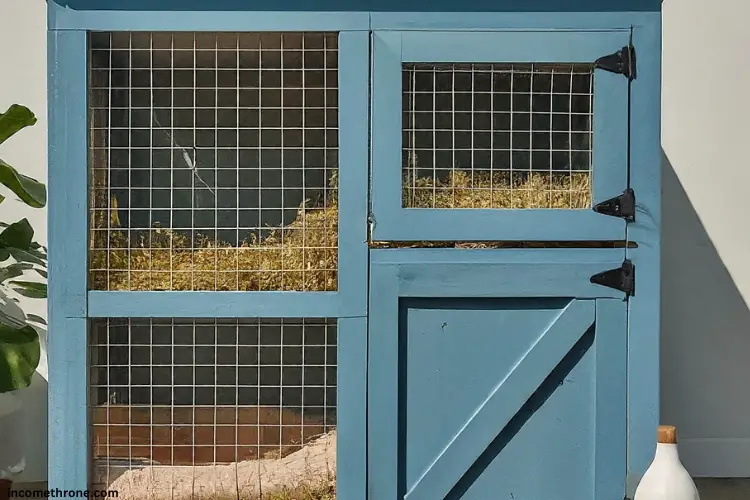
Creating the Perfect Home for Your Holland Lop
Choosing the Right Housing
Your Holland Lop needs a safe, spacious environment to thrive. Consider the following:
- Cage size: Minimum 24″ x 24″ x 24″ for a single bunny, larger is better
- Flooring: Solid, non-slip surfaces to prevent injury
- Multiple levels: Ramps and platforms for exercise and exploration
- Security: Ensure the enclosure is escape-proof and predator-safe
Setting Up the Living Space
Within the cage, include:
- A hiding spot or bunny house for security
- Separate areas for eating, sleeping, and toileting
- Chew toys for dental health and entertainment
- A heavy ceramic water bowl to prevent tipping
Indoor vs. Outdoor Housing
While indoor housing is generally recommended, some owners opt for outdoor setups. If considering outdoor housing:
- Ensure protection from extreme temperatures
- Predator-proof the enclosure
- Provide shade and shelter from rain
- Bring your bunny indoors during severe weather
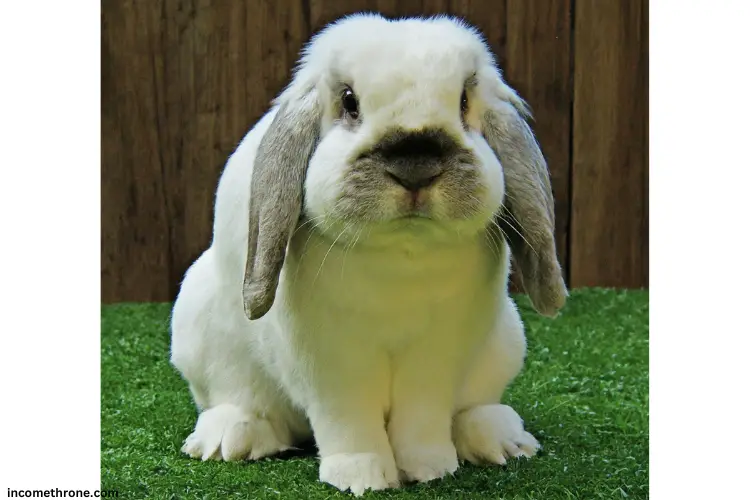
Nutrition: Fueling Your Holland Lop’s Health
Proper nutrition is crucial for your Holland Lop’s well-being. Let’s break down their dietary needs:
Essential Components of a Holland Lop Diet
- Hay: 70-80% of the diet, available 24/7
- Fresh vegetables: 10-15% of the diet
- High-quality pellets: 5-10% of the diet
- Treats: Less than 5% of the diet
Types of Hay for Holland Lops
- Timothy hay: Ideal for adult rabbits
- Alfalfa hay: Suitable for young, pregnant, or nursing rabbits
- Orchard grass: A good alternative to timothy hay
Safe Vegetables for Holland Lops
Offer a variety of leafy greens and vegetables, such as:
- Romaine lettuce
- Carrot tops
- Cilantro
- Parsley
- Bell peppers
Introduce new vegetables gradually to avoid digestive upset.
Choosing the Right Pellets
Look for pellets that are:
- High in fiber (18% or more)
- Low in protein (14-16%)
- Free from added sugars or artificial colors
Treats and Foods to Avoid
While treats can be a great bonding tool, use them sparingly. Safe treats include:
- Small pieces of fruit (apple, banana, berries)
- Store-bought rabbit treats in moderation
Avoid giving your Holland Lop:
- Chocolate
- Avocado
- Onions
- Garlic
- Any processed human foods

Health and Grooming: Keeping Your Holland Lop in Top Shape
Regular health checks and grooming are essential for your Holland Lop’s wellbeing.
Daily Health Checks
Perform a quick health check daily, looking for:
- Bright, clear eyes
- Clean ears
- Normal droppings
- Healthy appetite
- Active behavior
Grooming Routine
Holland Lops have relatively low grooming needs, but regular care is still important:
- Brush your bunny 1-2 times a week to remove loose fur
- Trim nails every 4-6 weeks or as needed
- Check ears weekly for signs of infection or mites
- Spot clean as necessary to keep the coat clean
Common Health Issues in Holland Lops
Be aware of these potential health concerns:
- Dental problems
- Gastrointestinal stasis
- Ear infections
- Respiratory issues
- Overgrown nails
Regular vet check-ups can help catch and address these issues early.
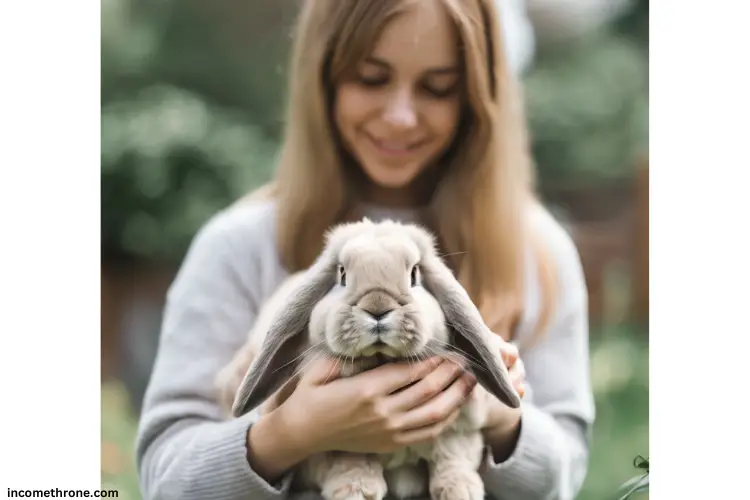
Exercise and Enrichment: Keeping Your Holland Lop Happy
Holland Lops are active and intelligent creatures that need mental and physical stimulation.
Daily Exercise Needs
Aim for at least 3-4 hours of out-of-cage time daily. Ensure the exercise area is bunny-proofed to prevent accidents.
Enrichment Activities
Keep your Holland Lop entertained with:
- Cardboard tunnels and boxes
- Willow balls and other chew toys
- Treat-dispensing toys
- Digging boxes filled with shredded paper
Social Interaction
Holland Lops are social animals. Spend time daily:
- Petting and talking to your bunny
- Playing gentle games
- Simply sitting nearby as they explore
Consider adopting a pair of bunnies for constant companionship.
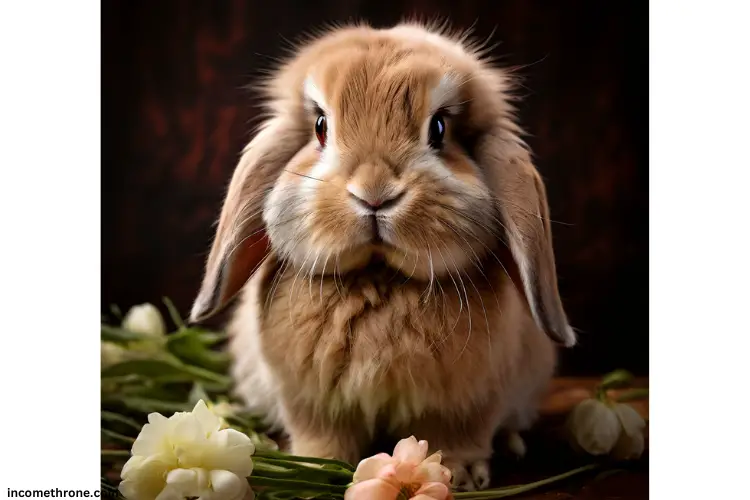
Training Your Holland Lop
Believe it or not, Holland Lops can be trained! Here are some basics:
Litter Box Training
- Place a litter box in the corner your bunny prefers for toileting
- Use rabbit-safe litter
- Reward with treats when they use the box correctly
Basic Commands
Teach your Holland Lop simple commands like:
- Coming when called
- Standing up on hind legs
- Spinning in a circle
Use positive reinforcement with treats and praise.
Bonding with Your Holland Lop
Building a strong bond with your bunny takes time and patience. Here are some tips:
- Spend time near the cage, talking softly
- Offer treats from your hand
- Sit on the floor during playtime, allowing your bunny to approach you
- Never force interaction; let your bunny come to you
Preparing for Emergencies
Being prepared for emergencies is crucial. Keep on hand:
- Contact information for a rabbit-savvy vet
- A pet first-aid kit
- Critical care formula for syringe feeding if necessary
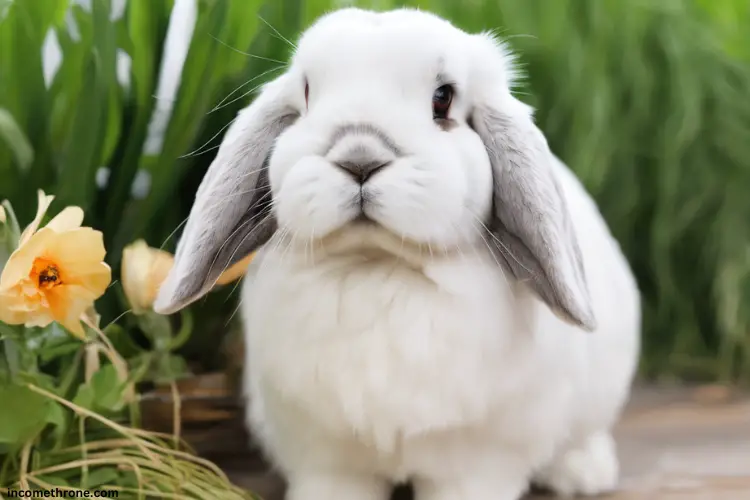
Holland Lop Care Through the Seasons
Seasonal changes can affect your Holland Lop’s care needs:
| Season | Care Considerations |
|---|---|
| Spring | Watch for allergies, start flea prevention |
| Summer | Provide cooling methods, increase water intake |
| Fall | Prepare indoor spaces for more time inside |
| Winter | Protect from drafts, maintain indoor humidity |
Frequently Asked Questions About Holland Lop Care
To address common concerns, here are answers to frequently asked questions:
- How often should I clean my Holland Lop’s cage? Spot clean daily, deep clean weekly.
- Can Holland Lops live with other pets? With careful introduction, they can coexist with some pets, but supervision is crucial.
- Do Holland Lops need vaccinations? Consult your vet about recommended vaccinations in your area.
- How can I tell if my Holland Lop is happy? Look for signs like binkying (happy hops), purring, and relaxed posture.
- Is it okay to pick up my Holland Lop? Yes, but always support their hindquarters and never pick them up by the ears.
Conclusion:
Caring for a Holland Lop bunny can be a rewarding experience. By providing proper housing, nutrition, health care, and enrichment, you’ll create a happy, healthy environment for your furry friend. Remember, every bunny is unique, so pay attention to your Holland Lop’s individual needs and preferences.
With patience, love, and the right care, your Holland Lop can become a cherished companion for many years to come. Embrace the joy of bunny ownership, and don’t hesitate to seek advice from veterinarians or experienced rabbit owners when needed. Your dedication to your Holland Lop’s well-being will be rewarded with a delightful and affectionate pet.
